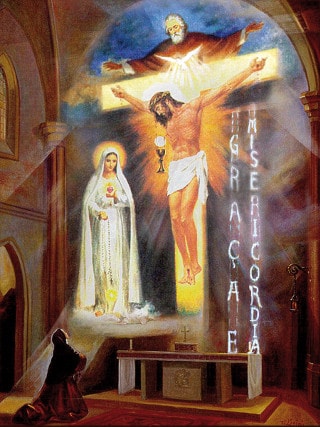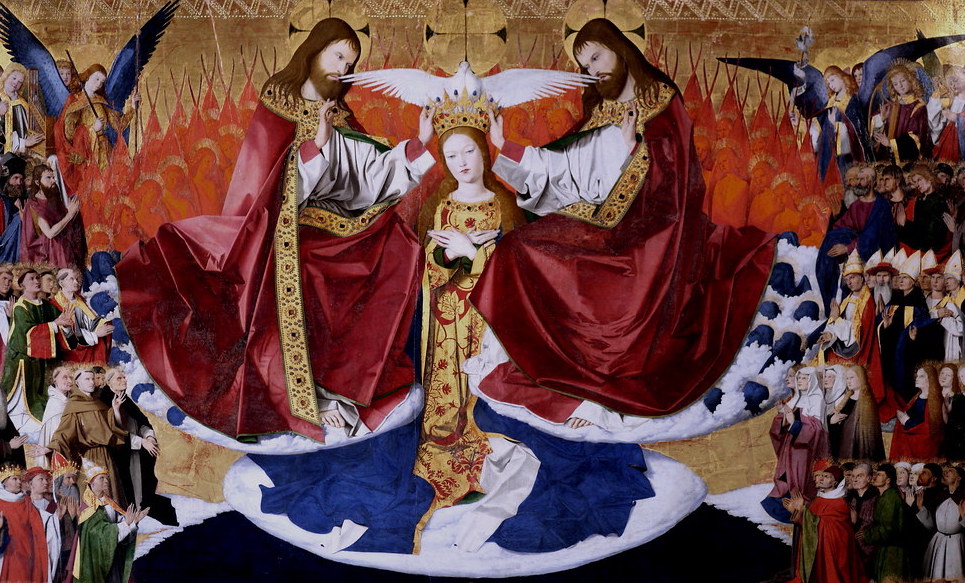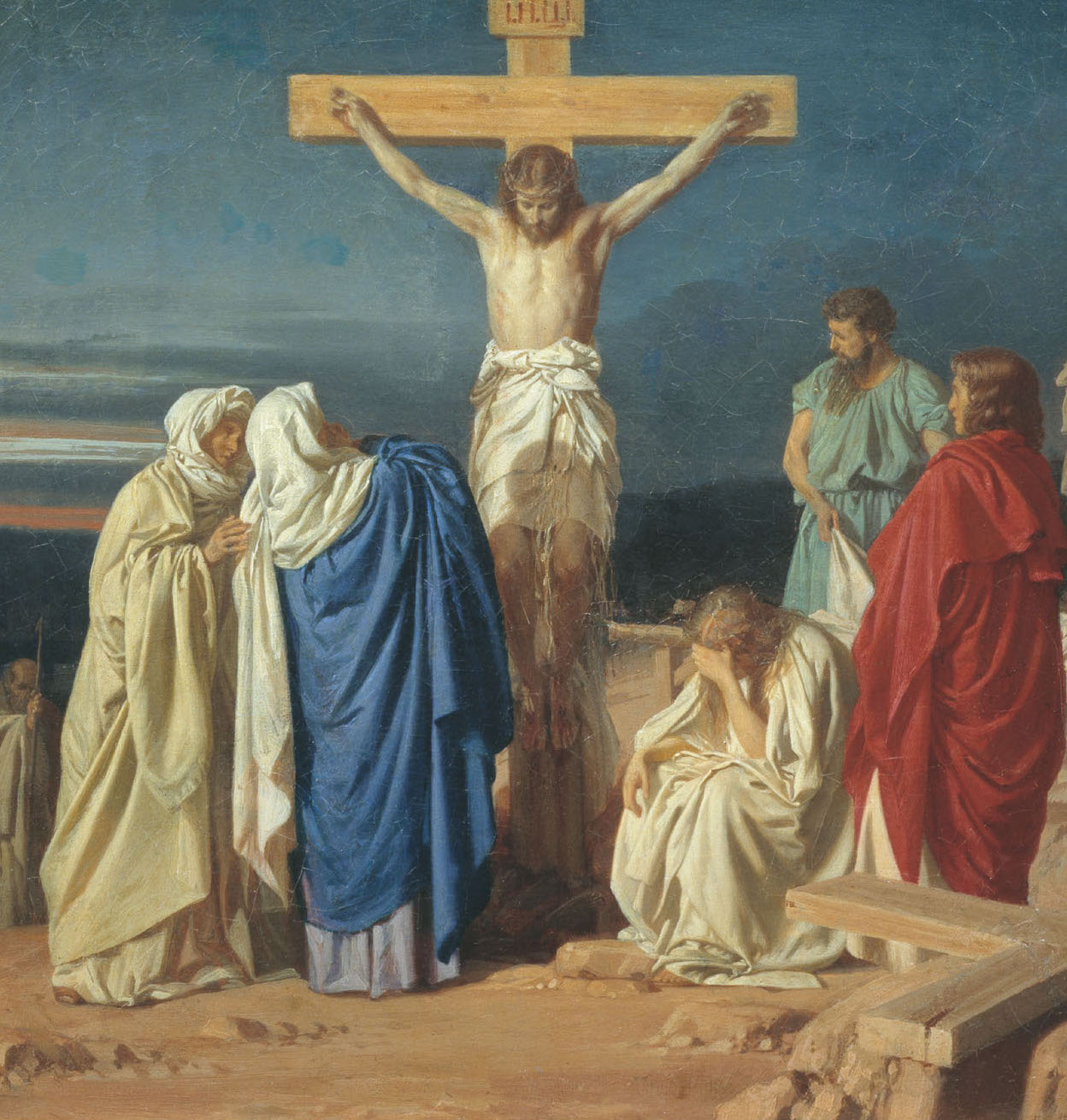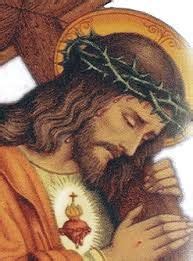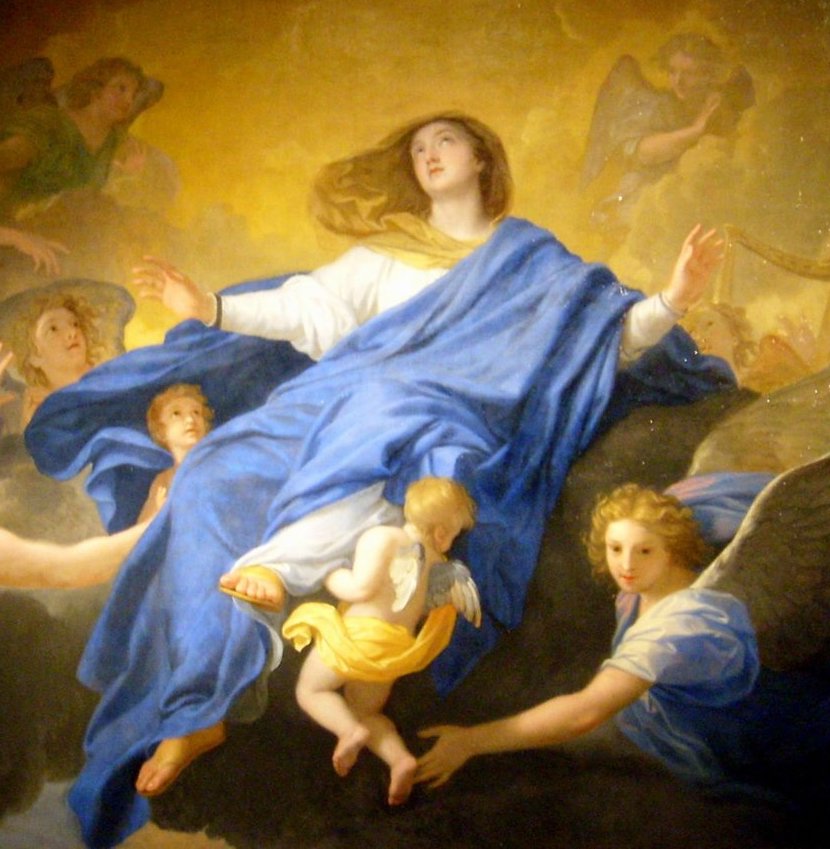This1st Saturday in October is the 900th anniversary of the Eucharistic miracle at Bettbrunn in Germany. So let’s meditate on the Eucharist, the true summit of the Christian life and of the 1st Saturdays of the month. The Holy Curé d’Ars used to say: “All the good works put together [of the whole history of the world] do not equal the sacrifice of the Mass, because they are the works of men, and the Holy Mass is the work of God.” This unfathomable mystery of the Eucharist, instituted by Our Lord on the evening of Holy Thursday, could be meditated on for a lifetime. Today, we’re going to start by simply asking the question: what is the Eucharist or Holy Mass really? We’ll be highlighting two fundamental aspects:

1/ The Eucharist, sacrifice. It is the bloodless renewal of the sacrifice of the Cross. In other words, Our Lord offers himself once again as a real victim for our salvation. Why is this so? If the sacrifice of the Cross on Calvary is total, complete and sufficient for our redemption, Jesus, in his infinite goodness and love, wanted to make this sacrifice present and real at every mass (without suffering or death). At each Eucharist, the renewal of His sacrifice once again comes to make reparation for the sins of mankind committed every day. The apparition of June 13, 1929 to Sister Lucy of Fatima illustrates this perfectly. She saw above the altar the chalice and host, with Jesus crucified just behind. (Image opposite). So, at consecration, we ourselves are truly at the foot of the Cross with the Immaculate Heart of Mary.
If Christ offers himself to the Father through the ministry of the priest, the faithful also have an important and often overlooked role to play. They don’t just unite their inner selves to Christ’s sacrifice. Together with the priest, they offer Christ’s sacrifice to God. This is a major act that may seem strange, and requires some explanation. Any offense against an infinite God is de facto infinite. But we are merely finite, imperfect creatures, and it is therefore impossible for us to make reparation for our sins: it is Christ, the Son of God, who has come to make reparation for them. This is the mystery of Redemption. But through baptism, we have become members of Christ’s Mystical Body. So, despite our imperfect creaturely state, we can offer God a perfect sacrifice, that of Christ Himself, in consecration. God thus receives a just reparation, and as a result, through the merits of Jesus Christ, we can be saved and obtain eternal life.
This is one of the splendors of the Eucharist, so far removed from the notions of simple “meal”, “assembly”, “praise” or “commemoration”. We are in the reality and grandeur of the Sacrifice of Jesus Christ, who offers himself anew out of love for us. And given the importance of this truth, the Council of Trent was very clear on this point: ” If anyone says that in the Mass a true and authentic sacrifice is not offered to God (…) If anyone says that the sacrifice of the Mass is only a sacrifice of praise and thanksgiving, or a mere commemoration of the sacrifice accomplished on the cross: let him be anathema. ”
2/ The Eucharist, sacramental communion. Here we meditate on the most beautiful of the seven sacraments, for it is the only one that contains Our Lord himself: Christ is here with his body, his blood, his soul and his divinity. As we know, this sacrament is characterized by the change of substance (transubstantiation) of bread and wine into the body and blood of Our Lord. Like the apostles on the evening of the Last Supper, we cannot see this change of substance with our senses. It’s invisible to human eyes, and impossible according to natural laws. Every Eucharist is therefore a miracle that requires an act of faith on our part: despite our senses telling us otherwise, our intelligence and soul tell us that the bread and wine have truly become the body and blood of Jesus Christ.
The reason for this act of faith required at every celebration of the Eucharist can be found in the Gospel. After doubting Jesus’ Resurrection (and therefore doubting His real presence), Saint Thomas comes face to face with Him a week later, and sees Him truly present through his senses. Jesus said to him: “Because you have seen me, you have believed; blessed are those who believe without seeing” (Jn 20:26). Because God wants us to be happy, He asks us at every Mass to believe without seeing.
Finally, we can consider a second aspect of communion. As we have already emphasized, we are members of Christ’s Mystical Body. By instituting this sacramental communion in the Eucharist, Our Lord materializes our membership of His Mystical Body. His words in the Gospel are thus fulfilled : “He who eats my flesh and drinks my blood remains in me, and I in him”. (Jn 6:56). In his book Le très Saint Sacrement, Saint Pierre Julien Eymard explains: “All Christians spread across the face of the earth are members of the mystical body of Jesus Christ. members of the Mystical Body of Jesus ChristHe, who is its soul, must be everywhere, spread throughout the body, giving life and sustaining it in each of its members.
The admirable characteristics of the Holy Eucharist we have just seen – sacrifice, sacrament and communion – show its importance and its eminently sacred character. Our attitude, both interior and exterior, must therefore be in tune with such unfathomable reality. St. John Eudes summed up how we should behave in one sentence: “The Sacrifice of the Mass is something so great, that it would take three eternities to offer it worthily: the first to prepare for it , the second to prepare for it, and so on. to prepare for itthe second to to celebrate itthe third to give just thanks thanksgiving . “
Preparing for it… The greatness of the Eucharist requires us to prepare our whole being – body and soul. The body prepares itself with Eucharistic fasting and a respectful attitude. The soul is prepared inwardly through recollection. We need to empty our minds of earthly thoughts and distractions, and in silence prepare our hearts to welcome Jesus with love and gratitude. We must also let go of any resentment we may feel towards others. Before we offer Jesus’ sacrifice before the altar, let’s remember His words: “If then, as you present your offering at the altar, you remember that your brother has something against you, leave your offering there before the altar, and go first to be reconciled with your brother, and then come back and present your offering.” (Matt 5:23-24)
Celebrating him… What respect we should have for Jesus, both in our souls and in our outward attitudes! Here we better understand Saint Paul’s words : “Whoever eats of this bread, or drinks of the cup of the Lord unworthily, is guilty of the body and blood of the Lord”. (Cor 11:27). That’s why, in order to receive Communion, our soul must be in a state of grace (without mortal sin). As for our outward attitude, shouldn’t we ask ourselves how we receive the Sacred Host? A bishop, author of the book “Corpus Christi“, recently explained that taking Christ without any sign of adoration, standing in the hand “like taking a piece of candy“, clearly trivializes the Eucharist and inevitably leads to a loss of the sense of the sacred. Let’s take advantage of this meditation to reflect on this important issue with a clear conscience.
Thanksgiving… Note that the physical presence of Jesus in us lasts about fifteen minutes, after which time the Sacred Host is physically absorbed by the body, and Christ’s real physical presence disappears. And what do we do during these fifteen minutes? Do we keep Him company as if He were someone we love above all else, or do we forget Him after a few seconds? Do we stay with Him in the church while He’s inside us, or do we rush off for a chat? Here too, let’s reconsider our attitude after communion.
Finally, let’s not forget that we have an incomparable helper when it comes to making holy and pious communion: the Blessed Virgin. She was the first to receive Jesus’ body at the Incarnation. She knew better than anyone how to keep Him company, love Him and speak to Him. Pope Benedict XVI pointed us in this direction: “May the Virgin Mary, Woman of the Eucharist, introduce us to the secret of true adoration. Her heart, humble and simple, was always gathered around the mystery of Jesus, in which she adored the presence of God and His redeeming Love.”
So, before each communion, let us ask Our Lady to help us better understand the greatness of the Eucharist; to help us keep company with her Son Jesus during those fifteen minutes when He is in us. She is our Mother, and she will give us all the graces we need to do so.
Author: Alliance 1ers samedis de Fatima
